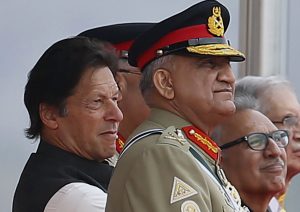Historically, none of Pakistan’s prime ministers have completed their five-year terms. It is rare for any premier to remain prime minister for more than three years: only three of 22 have managed to cross the four-year mark in the last 74 years. Interestingly, most of them were removed through extra-constitutional/parliamentary or judicial actions, yet no premier has been ousted through a no-confidence vote.
It isn’t surprising then that Prime Minister Imran Khan’s fourth year in power has been turbulent.
Although the military insists it has no role in politics, it is no secret that its backing has been a stabilizing factor for a Khan administration that has struggled to govern.
Under the Pakistan Tehrik-e-Insaaf (PTI) government, the country has plunged into economic turmoil, with soaring inflation and mounting debts. Khan’s blatant bid to realign Pakistan’s foreign policy toward Russia and China through an anti-Western narrative has added to the country’s financial woes due to taxing demands put forward by the International Monetary Fund and an insatiable Financial Action Task Force (FATF).
Until now, Khan’s political narratives have always aligned with that of the military establishment, and he has often found mentors in spy chiefs, from Hameed Gul to Shuja Pasha and Faiz Hamid. Yet, his attempt to delay Hamid’s transfer out of the intelligence agency was unprecedented and irked the military establishment top-down.
At some point in their careers, the crème de la crème of Pakistan’s political establishment has been engaged and groomed for top civilian offices by the military establishment. The same political elite – from Zulfikar Ali Bhutto to his daughter Benazir Bhutto and Nawaz Sharif – has also cried foul after falling out of favor.
Back in the 1970s, Nawaz Sharif was propped up as a rival to Bhutto after the latter nationalized Sharif’s steel business. He was elected prime minister thrice, in 1990, 1997, and 2013. The political turmoil that benefited Benazir and a military coup led by Gen. (ret.) Pervez Musharraf prematurely ended Nawaz’s first two terms.
The third was a judicial ouster that disqualified him for life from holding a public office. Since then, Nawaz has been unabashed in his criticism of the military’s role in politics – criticisms rivaled only by far-right leader Maulana Fazl ur Rehman, who was ejected from Parliament in 2018 after three consecutive runs as a member of the National Assembly (NA).
Maulana leads the opposition alliance, which united under the banner of the Pakistan Democratic Movement (PDM) to initially pursue an end to the military’s involvement in politics. The movement has since changed gears and now seeks the removal of the “selected” (Khan) over the “selector” (the establishment).
The abrupt omission of anti-establishment rhetoric from the opposition alliance’s narrative is all but shocking as we see Maryam Nawaz, a harsh critic of the army’s involvement in politics, fade into the background as her uncle, Shehbaz Sharif, and former president Asif Ali Zardari take over the reins of the movement.
Shehbaz insisted in an interview on Tuesday that his party, the Pakistan Muslim League-Nawaz (PML-N), had never disrespected the military and refuted allegations that the party is behind an ongoing anti-army social media campaign. Instead, he accused the ruling PTI of maligning the armed forces. He is the opposition’s candidate for the prime minister’s post ahead of the no-confidence vote against Khan.
The opposition’s quest to unseat Khan is just another episode in Pakistan’s political triangle where familiar characters are once again competing to win the military establishment’s support.
At this point, the military establishment’s neutrality has allowed the collapse of coalitions and brought overnight changes in loyalties, with the PTI seeing many of its lawmakers defect ahead of the no-confidence vote.
Khan, however, remains adamant that he will not resign and relies on public support. His recent remarks at a public rally imploring the masses to choose between “good” and “evil,” as “only animals stay neutral,” in conflicts lays bare his arrogance and self-righteousness.
In his bid to remain steadfast in his crusade against corruption, Khan is attempting to solve a political crisis with administrative moves. His government has sought the Supreme Court’s opinion on Article 63-A of the Constitution, which deals with the disqualification of parliamentarians over defection.
Ironically, the constitutional amendment was added by the very same opposition alliance in a move to deter party members from defecting.
Unfortunately for Khan, the political elite has attached itself to the country’s democratic process. A political landscape minus Nawaz or Zardari is an impossible endeavor in a democracy rooted in dynasty politics, as we see Maryam and Bilawal Bhutto Zardari ready to step into their father’s shoes in order to maintain the status quo.
With the Parliament set to meet on Friday, the next couple of days will decide not just Khan’s fate but the future of democracy in Pakistan. Will Khan become the first premier to complete his term or will he be the first prime minister to be ousted through a vote of no-confidence? We will know soon.

































